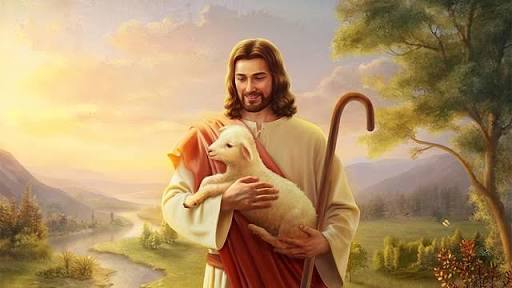Sunday, April 25, 2021
Fourth Sunday of Easter
First Reading: Acts 4:8-12
Responsorial Psalm: Psalms 118:1, 8-9, 21-23, 26, 28-29
Second Reading: 1 John 3:1-2
Gospel: John 10:11-18
The fourth Sunday of Easter is traditionally called The Good Shepherd Sunday. This is because on this day, every year, the Gospel reading comes from chapter 10 of John’s Gospel which talks about Jesus as the Good Shepherd. In this chapter we have two “I am” sayings of Jesus; “I am the gate” and “I am the good shepherd.” Throughout the Old Testament, Ps 23, 74, 79, 80, 95 and 100, God is repeatedly portrayed metaphorically as the shepherd of His people. This is especially so in the Psalms. In Psalm 23, we say, “the Lord is my shepherd, there is nothing I shall want.” At the background of the idea of God as the shepherd of His people is the contrast with the kings of this world who are mostly bad shepherds who exploit the flock entrusted to them.
Ezekiel chapter 34:23 talks about the Messiah as a shepherd. God promises to gather, heal and shepherd the scattered flock. He will raise up a king like David who will rule with integrity and righteousness. When Jesus the son of David calls Himself the Good Shepherd, His first century audience would have understood that He was talking about Himself as the Messiah who will come. Jesus is the one who perfectly fulfills this divine promise.
Church history tells us that the early Christians had a special love and attraction for the image of the Good Shepherd. They put the image everywhere; in the church, in their homes, in the catacombs and walls in public places including on coffins. That was because the image of the good shepherd reminded the suffering and persecuted Christians that God was always present among them, that God loved them, cared for them and guided them every moment of their lives especially in times of trials and persecution. So, the image of the good shepherd is linked to the reality of divine providence, the truth that God is the author of history and everything works mysteriously for the good of those He loves.

Being a shepherd during the time of Jesus was a full-time job. The shepherds stay with the sheep always, looking out for fresh pastures, keeping an eye for predators, and at night lead them to the sheepfold. He himself will sleep lying at the entrance of the sheepfold so that he quite literally becomes the gate of the sheepfold. Sometimes several shepherds will share the same sheepfold. What that means is that the sheep will intermingle. In the morning how do they know which sheep belongs to who? In 1934, N. V. Morten wrote a book he called “In the Steps of the Master.” It is an account of his visit to the Holy Land. This is before the establishment of the modern State of Israel. The modern state of Israel as we know it today was established in 1948. In this book, Morten narrates a fascinating scene he witnessed one morning. He observed two shepherds whose sheep had shared one sheepfold the previous night. One shepherd stood some distance from the sheep and began to call out to his sheep; first, one came, and another came, one by one they kept coming and he was counting them until they were complete. Then he walks ahead, and they follow him. In the words of the St. John, “the sheep hears his voice, one by one he calls his own sheep and leads them out. When he has brought out his flock, he goes ahead of them and the sheep follow because they know his voice.”
This is very fascinating and makes us to stop and ponder. Do you listen to the voice of the shepherd? Do you recognize his voice? Do you follow where he leads? The image of Jesus being a shepherd is an endearing image, one that helps us to turn to our Lord, as a child would turn to a parent in need. It reveals Jesus as the tender and gentle Lord Who welcomes and cares for us with dedication. In our Lord’s description of Himself as the Good Shepherd, we see the heart of Jesus and the most important quality of a good shepherd. He is one who “lays down his life for the sheep.” He is the one who risks his life for his sheep, he is willing to suffer, out of love, for those entrusted to his care. He is the one who chooses the life of the sheep over his own life. At the heart of this teaching is sacrifice. A shepherd is sacrificial. And being sacrificial is the truest and most accurate definition of love.
As sheep who follow the Good Shepherd, we must also strive daily to imitate His sacrificial love for others. We must be Christ, the Good Shepherd, to others every day. And the way we do this is by looking for ways to lay our lives down for others, putting them first, overcoming every selfish tendency, and serving them with our lives. Love is not only experiencing endearing and heartwarming moments with others; first and foremost, love is about being sacrificial.
Happy Sunday

Fr Chidi Onwuka MSSCC
